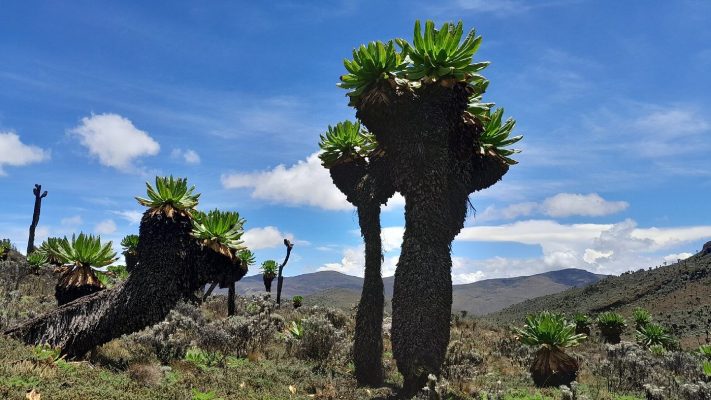Mount Elgon National Park
Mount Elgon National Park, straddling the border of Uganda and Kenya, is a captivating natural wonder that boasts diverse ecosystems, rich biodiversity, and stunning landscapes. Established in 1992, the park covers an area of approximately 1,500 square kilometers on the Ugandan side and 400 square kilometers on the Kenyan side, making it one of the largest national parks in East Africa.

The park is centered around the extinct Mount Elgon volcano, which features a unique caldera, extensive cave systems, and lush vegetation that hosts a variety of wildlife.
Geological and Historical Background
Mount Elgon is one of the oldest volcanoes in East Africa, formed over 24 million years ago. Its summit, Wagagai Peak, rises to 4,321 meters, making it the fourth highest mountain in East Africa. The mountain’s geological features include a large caldera, which measures about 40 kilometers in diameter, and numerous volcanic formations.
The area has a rich cultural history, with the indigenous Bakiga and Bagisu people historically inhabiting the region. Their customs and traditions are deeply intertwined with the mountain, which they consider sacred. The park’s establishment aimed to conserve the unique flora and fauna of the region while providing a space for local communities to engage in sustainable practices.
Biodiversity and Ecosystems
Mount Elgon National Park is renowned for its rich biodiversity, supporting a wide range of ecosystems that vary with altitude. The park is home to more than 300 species of birds, including the rare Lammergeyer and Jackson’s Francolin. It also hosts several species of mammals, including elephants, buffalo, and various primates.
- Montane Forest Zone: The lower altitudes (1,200 to 2,500 meters) are characterized by dense montane forests filled with tree species like Elgon teak, podo, and giant lobelias. These forests provide habitat for numerous bird species and mammals, such as the black-and-white colobus and blue monkeys.
- Bamboo Zone: Above the montane forest lies a bamboo belt (2,500 to 3,000 meters). The bamboo is vital for wildlife, especially elephants, which feed on the shoots. This zone is also home to various birds and small mammals.
- Heath and Moorland Zone: Higher up, the vegetation transitions to heathland and moorland, characterized by heather, giant groundsel, and lobelia. These ecosystems are less diverse but feature unique plant species adapted to the harsher conditions.
- Alpine Zone: At the highest elevations, above 3,500 meters, the landscape becomes more barren, with rocky outcrops and low-growing vegetation. This zone is primarily a habitat for hardy species that can withstand the extreme conditions found at this altitude.
Wildlife In Mount Elgon National Park
Mount Elgon National Park is home to a rich array of wildlife, contributing to its status as a biodiversity hotspot. Notable species include:
- Elephants: The park supports a significant population of elephants, which play a crucial role in shaping the ecosystem by helping to disperse seeds and maintain forest diversity.
- Primates: Various primate species inhabit the park, including blue monkeys, black-and-white colobus monkeys, and the endangered L’Hoest’s monkey.
- Birds: The park is a birdwatcher’s paradise, with over 300 species recorded. The Lammergeyer, a scavenging bird of prey, and the colorful Great Blue Turaco are among the highlights.
- Large Mammals: Other wildlife includes buffalo, bushbuck, and duikers, which roam the lower slopes of the mountain.
Main Attractions In Mount Elgon National Park
- Wagagai Peak: The highest point of Mount Elgon, Wagagai, is a popular destination for trekkers. The climb to the summit offers breathtaking views of the surrounding landscapes and the expansive caldera.
- Caldera: The massive caldera is one of the park’s most striking features, offering opportunities for exploration and photography. Its size and geological significance make it a point of interest for visitors.
- Caves: Mount Elgon is famous for its extensive cave systems, including Kitum Cave. These caves have historical significance and are known for their salt deposits that attract elephants.
- Sipi Falls: Located on the Ugandan side of the mountain, Sipi Falls is a series of stunning waterfalls that offer spectacular views and opportunities for hiking, abseiling, and photography.
- Kapkwai Forest Exploration Centre: This center serves as a gateway for visitors, providing information on the park, trail maps, and guided tours to explore the diverse ecosystems.
Activities In Mount Elgon National Park
Mount Elgon National Park offers a variety of activities for visitors, making it a diverse destination for nature lovers and adventure seekers.
- Hiking and Trekking: The park is renowned for its hiking trails, with various routes leading to the summit and other scenic points. The Sasa, Sipi, and Piswa trails are popular choices, catering to different skill levels.
- Sasa Trail: A challenging and direct route to the summit, the Sasa Trail rewards hikers with spectacular views and an opportunity to see diverse wildlife.
- Sipi Trail: A more gradual ascent, this trail offers a scenic journey with views of Sipi Falls and lush vegetation, making it ideal for less experienced hikers.
- Piswa Trail: Known for its stunning views and diverse landscapes, this trail is suitable for those who want a longer trek with varied ecosystems.
- Birdwatching: With its rich avian diversity, Mount Elgon is a haven for birdwatchers. Guided birding tours are available, allowing visitors to spot rare species and learn about the park’s avifauna.
- Cave Exploration: Guided tours of the caves, such as Kitum Cave, provide insights into the geology and history of the area. Visitors can witness how elephants use the caves to access salt deposits.
- Cultural Tours: Engaging with the local communities, including the Bakiga and Bagisu people, offers a unique cultural experience. Visitors can learn about traditional customs, farming practices, and local crafts.
- Rock Climbing and Abseiling: The rocky outcrops around Sipi Falls offer excellent opportunities for rock climbing and abseiling, attracting adventure enthusiasts looking for adrenaline-pumping experiences.
Location and Accessibility
Mount Elgon National Park is located approximately 235 kilometers from Kampala, Uganda’s capital. The park is easily accessible by road, with the journey to Mbale, the nearest town, taking around four to five hours. From Mbale, various entry points, including the Kapkwai Forest Exploration Centre and Sipi Falls, can be reached with relative ease.
Visitors coming from Kenya can access the park from Kitale, which is about 400 kilometers from Nairobi. The park on the Kenyan side, while less developed, offers equally stunning views and trekking opportunities.
Conservation and Environmental Challenges
Despite its designation as a national park, Mount Elgon faces several environmental challenges that threaten its ecosystems and wildlife.
- Deforestation: Illegal logging and charcoal production have led to the loss of forest cover on the mountain. This has negative consequences for biodiversity, increased soil erosion, and disrupted water cycles.
- Human Encroachment: Expanding agricultural activities and settlements in the surrounding areas have encroached on protected land, leading to habitat loss for wildlife and increased human-wildlife conflicts.
- Poaching: Poaching poses a significant threat to wildlife, particularly elephants, which are targeted for their ivory. Conservation efforts are ongoing, but continued vigilance is essential for protecting the park’s fauna.
- Climate Change: Climate change has affected the park’s ecosystems, altering rainfall patterns and temperatures. This has implications for both wildlife and the local communities who depend on the mountain’s resources.
Conservation Efforts In Mount Elgon National Park
Conservation efforts in Mount Elgon National Park are essential for protecting its unique ecosystems and wildlife. Key initiatives include:
- Community Engagement: Involving local communities in conservation efforts helps reduce human-wildlife conflicts and promotes sustainable practices. Education and awareness programs highlight the importance of preserving the park’s resources.
- Anti-Poaching Initiatives: The Uganda Wildlife Authority and Kenya Wildlife Service work collaboratively to combat poaching through patrols, surveillance, and community partnerships.
- Restoration Projects: Efforts to restore degraded areas of the park focus on reforestation and rehabilitation of native plant species to enhance biodiversity and improve habitat quality.
- Research and Monitoring: Ongoing research and monitoring of wildlife populations, vegetation, and environmental conditions help inform conservation strategies and policy decisions.
Mount Elgon National Park is a gem of natural beauty and biodiversity, offering a unique blend of adventure, culture, and ecological significance. From hiking to the summit of Wagagai to exploring the extensive cave systems and engaging with local communities, the park provides a wealth of experiences for visitors. Conservation efforts are crucial to safeguarding this remarkable ecosystem for future generations, ensuring that Mount Elgon remains a vibrant and thriving habitat for its diverse wildlife and a beloved destination for nature lovers worldwide.
